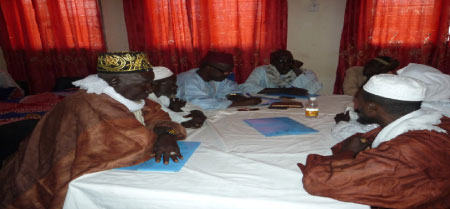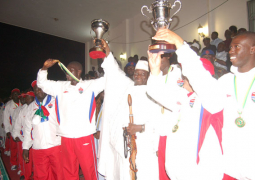
The campaign to eradicate female genital mutilation (FGM) has taken roots in The Gambia since the inception of Gamcotrap in 1984, through raising awareness and building consciousness among the people.
The organisation recently completed a series of trainings and awareness campaign activities in rural
The activity attracted more than two hundred participants selected from different parts of the region to take part in the exercise funded by the European Union under the Non-State Actors project in The Gambia.
Speaking at various meetings held in CRR north, the executive director of Gamcotrap, Dr Isatou Touray, spelt out the roles and responsibilities of the organisation in the crusade to end FGM and other related issues that affect the girl child and women’s reproductive health.
This, according to Dr Touray, is her organization’s principal obligation in ensuring that women’s capacities are built to the fullest to understand their bodily rights and engage the lawmakers for a constitutional reform to end the practice of FGM.
“Gamcotrap stands to promote the rights of women and the girl child, thus engage in social mobilization to dispel the misconceptions associated to FGM and religion as well as promoting the dignity of women,” said the Gamcotrap boss.
The workshops held at different locations in CRR north also availed participants the opportunity to engage on issues of female sexuality and other gender-based violence such as early and forced marriages, among others, that continue to suppress women in taking effective role in nation-building.
The participants were also taken through series of topics to further enlighten them on the giant leap taken by the Government of The Gambia in promoting the rights of women and children by ratifying the United Nations Conventions and the Protocol to the African Charter on Human and Peoples’ Rights on the Rights of Women in Africa, as well as the national laws on women and children.
It should be noted that despite these giant steps at the international and regional levels, at the moment there is no specific law to protect girls from FGM, even though The Gambia has committed itself under Article 5 of the Women’s Protocol to enact a specific law to protect girls and women from FGM.
At a forum in Janjanbureh, the chief of
This, the
“We the chiefs would not have participated in these activities if they were not in the interest of our people,” he said.
Haja Tandi Yaffa, a circumciser, noted that even though FGM is deep-rooted, it is through series of sensitization trainings that there would come consciousness of the effects it has on women and the girl-child.
Like most of her colleagues, she stated that they were made to believe that female circumcision was a religious injunction.
Imam Cherno Muhamadou Dem of Janjanbureh informed the participants that the practice of FGM is neither Farda (obligation) nor the teaching of prophet Muhammad (SAW) Sunnah’s but a traditional practice. Imam Dem said further that people are now aware that “there is no honour in the practice because it affects the health of women and cannot in any way be related to Islamic teachings”.
The Ward Councillor for Janjanbureh, Ebrima Janko Foon, called on parents to take responsibility to protect girls and women from the practice because “it has come to light that FGM has no religious significance”, furthermore women and children “are suffering from its effects”.
Kumba Ceesay of Janjanbureh Health Centre drew the attention of the participants to the impact of FGM on maternal and infant health.
She informed them that the role of Gamcotrap is very crucial and is recognised by the Ministry of Health and Social Welfare in their efforts as a ministry to improve maternal health.
In her remarks on the occasion, she pledged to include FGM in health talks during antenatal clinics with nursing mothers at her health centre.
At Sami Karantaba village, health officer Dodou Sonko informed participants that they are always faced with challenges to help women and children affected by the effects of FGM.
He cited a recent case of a girl who died while on referral to a major hospital due to uncontrolled bleeding caused by the practice of FGM.
Sami district Chief Seyfo Kassum Leigh reiterated that FGM “is not a religious issue but a harmful traditional practice”.
He referred to a well known scholar from the region who clarified that FGM is not an obligation on Muslim women. He further informed the participants that the six chiefs in the region support the advocacy for a law to protect the rights of women and girls from FGM in the country.
He noted that neighbouring
A well-known circumciser in Sami, Mbuleh Kandeh of Bayaba, testified that having made aware of the impact of the practice she took oath that she would stop the cutting of the girl-child, while appealing for more support for her to engage in meaningful skills that can provide her livelihood.
At Chamen Nianija Cluster, the chief of the area, Seyfo Alhajie Davis Allasan Cham, called on the women to be aware of the impact of the practice on their reproductive health and that of their daughters.
He highlighted that religion can no longer be used to justify the practice because people are now aware and the local authorities, including all the chiefs of the region, have given their public support to the campaign to stop FGM in the area.
“We the chiefs in the region have thrown our weight behind Gamcotrap and will work with them to stop the practice of FGM in the country,” said chief Cham.
The Nianija chief informed the young mothers that Gamcotrap is raising the awareness of the communities before a law is put in place. He also spoke at length on early and forced marriages in the country and called on parents to allow their girl children to reach puberty before giving their hands into marriage.
In their testimonies, participants pledged to protect their daughters and noted that they would not accept travelling circumcisers into their communities to conduct the practice.
At Janjanbureh, EU Non-State Actors Programme Manager Christina Valentza and the NSA –SP Monitoring and Evaluation Expert Ms Kay Sey witnessed the training and noted with satisfaction Gamcotrap’s approach to reach the grassroots.
It would be noted that there is increased acknowledgement among local authorities and religious leaders that FGM can no longer be claimed as a religious issue because Islam does not promote any unnecessary suffering among its ummah, and the dignity of the woman is respected.
All the participants noted that health is a priority for all and called on religious leaders to speak out and make it clear to their followers that “FGM is not a religious injunction”.


